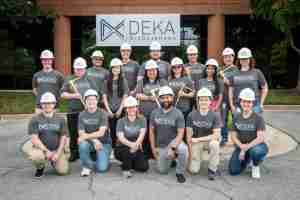
Six Strategies to Retain Employees Amidst the Great Resignation
Workforce Genetics is the executive and scientific search division sister to BioBuzz Media that provides unparalleled recruiting services to venture-backed and growth stage biotechnology companies.
The Great Resignation has had a massive impact on the American workplace. No matter if you’re a business owner, a manager, or working in the talent field, you have experienced it firsthand.
In fact, in the past 18 months greater than 53% of Americans changed jobs.
That’s a staggering number, for sure, but what does this mean for your current hiring or HR goals this year?
The Great Resignation is not the only challenge facing talent professionals, hiring managers and business owners. The disruptive forces unleashed by the Great Resignation have collided with other new, emerging hiring variables and hurdles, creating a uniquely complex and challenging talent landscape.
Specifically, the remote/working-from-home trend and the macro economic climate have had enormous impacts on businesses. Whether it’s adjusting work norms, developing existing talent, attracting new talent, or building and enhancing diversity and inclusion programs, HR and talent teams face myriad obstacles, some of which are somewhat familiar and others that are completely foreign and new.
If a company has hired anyone in the past nine months, there’s no doubt that they’re paying a premium. Candidates are now in the driver seat because of skill shortages, increased employer need, greater talent competition. This, in addition to inflationary pressures, is resulting in rising wages and salaries, which have, in some cases, jumped upwards of 20%.
Business owners are caught in a proverbial Catch-22: if they don’t pay a premium, they can’t hire the best talent. And if they do pay a premium for new hires, this could negatively impact current employees, making them more likely to depart for supposedly greener pastures.
Many HR and hiring teams face this conundrum of paying higher premiums for talent. In some cases, these teams face a backlash as existing employees see many new employees coming in at higher salaries, which creates the perception that the existing workforce is being hit with an Incumbent Employee Tax for their loyalty and commitment to the mission.
Those are just a few of the tough decisions facing human resources and talent teams today.
My team and I at Workforce Genetics work closely with dozens of life science employers to help them to recruit and attract the best life science talent. We understand first hand the pressure that executives and talet leaders are faced with when it comes to today’s complex talent challenges, especially when it relates to recruitment or retention.
Our advice is that business owners have to deal head on with this new talent market dynamic because it isn’t a binary decision. You have to have both a competitive talent attraction strategy as well as a talent retention strategy. If not, you risk losing loyal team members while still paying the premium rate for new employees anyway.
Here are a few tips for business leaders to try to achieve this delicate balance between bringing new talent on board in a hyper-competitive talent market and retaining existing talent.
- Talk to employees about issues beyond production expectations. Get to the heart of the matter by openly discussing important and sometimes difficult questions. Ask if team members are happy. Ask them if they’re getting competing offers. Be sure to have honest dialog about what they need and if their role and the company is a great place to work for them and their family. Ask them if leadership can do more in the area of professional development and career advancement opportunities. If an employer or leadership team is not asking these questions, it’s a sure bet that an outside recruiter is.
- Don’t always look outside to fill current needs—identify existing employees that could be promoted. Helping a talented, existing employee with potential to advance their career goes a long way to building loyalty and retaining talent. Developing talent from within not only rewards promise and performance, it also shows other team members that loyalty and great work gets rewarded, that a future at the company exists and is achievable. Companies that align team member’s skills and wants to future goals and provide professional development pathways to reach these goals keep their talent.
- Treat talent like a community, not a commodity. This is Workforce Genetics’ mantra and we’ve been saying this for over a decade. Talent is a community and it needs to be nurtured. A company that builds an employee-centric culture which fosters a sense of community with their employees is proven to increase not only retention, but overall job performance.As executive leadership coach Chris Steer puts it, “Building up the relationship capital between human beings on your team is non-negotiable and serves individuals as well as the organization.”Think about your employees like an ecosystem. All the components of the ecosystem need to be working together to thrive and grow. This means that people need to feel a sense of belonging, safety and shared mission to want to stay there. This topic can be a whole article in itself but the best companies that build community within their workforce invest in corporate citizenship, employer branding, internal communications, and are very intentional with cross departmental engagement and learning.
- Create a loyalty bonus plan for current employees. This might not change their salary for the long term, however, it will show them appreciation and recognize their loyalty. Doing a company wide salary adjustment will take time and is a much larger overall project. So while that should be part of your strategy, in the short term you can offer a bonus or other incentives to incumbent employees to help rightsize their compensation. This can be based on tenure with the company or other metrics that are equitable under your HR regulations.
- Enhance your comp and ben package with equity rewards. Enhancing compensation packages with long-term stock incentives (LTI) will also help retain top talent. Now may be the time to create an LTI plan that aligns with your business goals and growth as it can be a great tool for retention. There are multiple options for companies to explore from stock option pools to phantom stock to profit sharing that provide some form of long term incentive to employees at all levels. Consulting with a financial professional can help a leadership team shape the best LTI program for their specific needs. Strong LTI programs can be a major differentiating factor when it comes to hiring and retaining talent.
- Conduct a company wide salary adjustment. The bottom line is that if the market continues along this path, every company will have to evaluate their current workforce and make adjustments to meet the market compensation rates. Many of your employees will realize this through promotions but those who do not have some other qualifying event will have to be right sized. You can delay this with the suggestions above but at some point you will have to take on this project if you want to remain an employer of choice for your employees.
If an employee is engaged honestly, is paid fairly and has growth opportunities, they tend to stay longer. Talent leaders need to continually adapt to a whirlwind of market factors, both micro and macro, to hire and retain the talent needed to succeed.
While winning the new hire war often gets more attention, neglecting current loyal and faithful employees in the process will fracture your talent community and have detrimental impacts over the long haul success of your business.
Investing in a healthy talent community strategy will position your company for success organically, with happy, loyal team members staying longer, which builds a strong culture and employer brand that in turn makes it easier to attract new talent. Hiring and retaining talent are two sides of the same whole and if one suffers neglect, your company cannot thrive and grow.
- About the Author
- Latest Posts
Over the past 11 years, Chris has grown BioBuzz into a respected brand that is recognized for its community building, networking events and news stories about the local biotech industry. In addition, he runs a Recruiting and Marketing Agency that helps companies attract top talent through a blended model that combines employer branding and marketing services together with a high powered recruiting solution.





